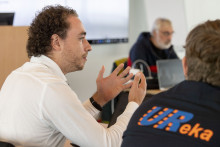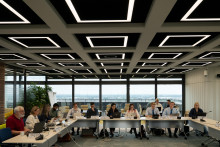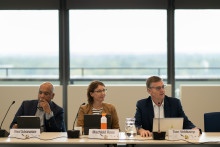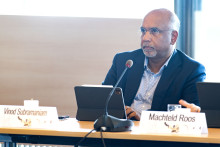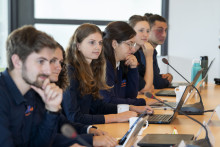Executive Board won’t stop collaboration with Capra law firm
Last month, the University Council strongly advised the Executive Board to stop working with law firm Capra Advocaten, often referred to as ‘the pit bull of government agencies’. According to the Council, the lawyers are said to use an ‘aggressive working method’ in conflict situations and the UT should therefore no longer hire the firm.
‘We don’t understand why it’s so difficult to terminate the collaboration with them, because their way of working often causes distress and anger for UT personnel involved,’ stated Council member Dick Meijer. ‘It also generates anxiety culture in some of the units, which is in contradiction with what people-first should entail.’
The Board, however, decided to keep using the Capra lawyers, at least in some selected cases. ‘We have taken your remarks very seriously and we are aware of all sensitivities surrounding this. If we need to choose the lawyer, we choose the lawyer wisely,’ responded UT vice-president Machteld Roos.
Concerns about new plans for Boerderij Bosch
Several users of Boerderij Bosch and the adjacent log cabins are worried about the new plans for this terrain. They fear a mixing of activities on the grounds if the UT expands its cooperation with the Vrije Universiteit (VU). The University Council is asking the Executive Board to look at alternatives.
The unrest is caused by the possible extension of the cooperation between the UT and the VU, if the joint Creative Technology programme is set to open in 2023. There is still uncertainty as to where these students will be housed - both the study and living areas. However, it seems that the log cabins next to Boerderij Bosch will be used as overnight accommodation. An option that cannot count on the support of the University Council. The current users are afraid that mixing it with a residential location will limit their current activities and make them virtually impossible. Users really do love that place and it's a historical and unique spot,' said Pieter Boerman in the University Council meeting. The Council is also frustrated by the lack of communication.
Machteld Roos, on behalf of the Executive Board, was able to take away some of the concerns of the Uraad. The current users can continue to use Boerderij Bosch. Moreover, there will be no education in Boerderij Bosch, but the log cabins are there to receive guests. That is why we are looking at those facilities. The cabins will be used for twenty to twenty-five days per year at most.'
Work pressure action plan
Following the recent employee wellbeing report, the University Council again raised its concerns about work pressure. ‘The perceived workload is still as high as four years ago. In the meantime there were many projects to get grips on problem of workload and possibly reduce it. You might say that this report reveals that not many improvements have been made’, Dick Meijer mentioned. On behalf of the council, he made several recommendations to reduce work pressure, like extra budgets for employee development, workload aware policy making, better capacity management and restoring the work-life balance.
Machteld Roos mentioned that the Executive Board does recognize that the workload is high among staff and that the board will take the council’s advises to heart. ‘Everybody is working on reducing work pressure. This wellbeing survey is not an end station, we will come with a plan of action. We will present an action plan after this summer.’
Lessons learned from the crisis?
The final topic that was discussed was whether (or when) the corona crisis was officially over. Jaime de Bruin from student party UReka, asked the executive board when we’re officially out of the crisis, will there be an evaluation about the lessons learned and will the two evening lectures ‘as a last resort’ still be an instrument?
President Vinod Subramaniam responded that ‘we are cautiously out of crisis mode, but still in action mode’. ‘There are still a lot of infections, but we are transitioning into a dynamic phase. We will have to deal with living with the virus.’
The Executive Board stated that there won’t be a big evaluation about the lessons learned from the crisis, since there are two working groups busy with exactly that. Then the board and council segued into a semantic discussion about hybrid and blended education – two almost similar yet very different concepts. Hanneke Becht (Campus Coalition) mentioned that ‘It’s getting worse with hybrid education, students are passive and interaction is lacking. That’s something we need to evaluate.’ ‘Blended is the way to go, not hybrid’, agreed Subramaniam. ‘We’re currently still transitioning from hybrid to blended education.’ Still, the Executive Board wants to wait for the reports from both working groups, before making any further moves or decisions.
Regarding the evening lectures, the council and board agreed that the instrument shouldn't 'linger around' and that the Executive Board will draw up criteria when it should be used, 'in case of emergency'.


